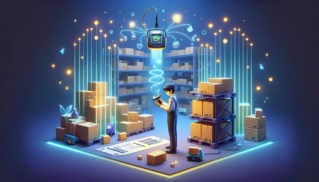Greetings! I'm Aneesh Sreedharan, CEO of 2Hats Logic Solutions. At 2Hats Logic Solutions, we are dedicated to providing technical expertise and resolving your concerns in the world of technology. Our blog page serves as a resource where we share insights and experiences, offering valuable perspectives on your queries.

Quick Summary
While off-the-shelf ERP systems like NetSuite, SAP, and Microsoft Dynamics offer standard manufacturing features, custom ERP solutions provide better long-term value for Texas manufacturers with unique processes, growth plans, or complex integration needs. The key is choosing based on your specific requirements rather than vendor marketing.
So, you’re running a manufacturing company in Texas and drowning in spreadsheets?
We get it. You’re juggling complex supply chains, managing tight production schedules, and trying to stay competitive in one of America’s largest manufacturing states. Your current system feels like it’s held together with duct tape and prayers, and you know you need an ERP system, but where do you even start?
You’ve probably heard about NetSuite, SAP, and Microsoft Dynamics. Maybe you’ve even sat through a few demos that left you more confused than when you started. The truth is, while these off-the-shelf solutions work for some manufacturers, they often create as many problems as they solve.
Here’s what most ERP vendors won’t tell you: sometimes the best ERP for manufacturing isn’t an ERP at all, it’s a custom solution built specifically for your business.
Let’s break down what works for Texas manufacturers and why custom ERP solutions might be the game-changer you never knew you needed.
Why Manufacturing Companies in Texas Need Specialized ERP Systems
Texas manufacturing isn’t just big, it’s uniquely complex, and your ERP system needs to handle everything from oil refineries to aerospace precision.
The Lone Star State produces everything from semiconductors in Austin to petrochemicals in Houston. Smart manufacturing is transforming production for businesses. Key discussions focus on automation, robotics, and data analytics. This diversity creates unique challenges that generic ERP systems weren’t designed to handle.
Consider these Texas-specific manufacturing realities:
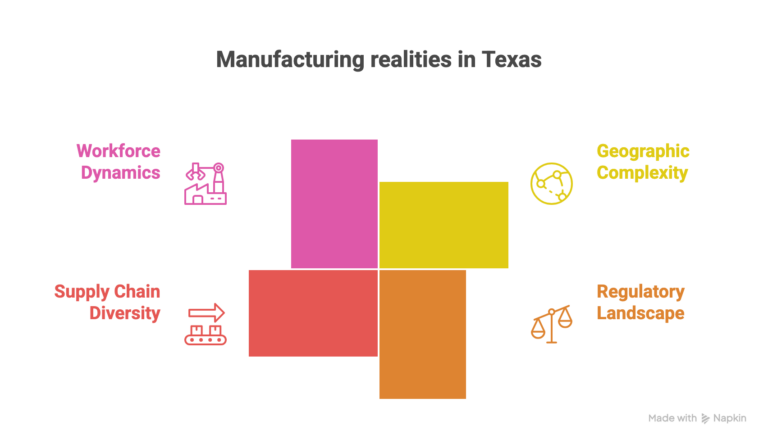
Geographic Complexity: Texas spans 268,596 square miles with manufacturing hubs scattered across multiple time zones. Your ERP system needs to coordinate operations between Dallas electronics plants and Corpus Christi refineries smoothly.
Regulatory Landscape: From EPA requirements for chemical manufacturing to FAA regulations for aerospace, Texas manufacturers navigate a complex web of compliance needs. Manufacturing ERP solutions help businesses overcome common challenges such as:
- Reducing Production Delays: Enhancing visibility into supply chain and production schedules, preventing bottlenecks.
- Lowering Operational Costs: Automating repetitive tasks, optimizing material usage, and minimizing waste.
- Ensuring Regulatory Compliance: Meeting industry standards like ISO 9001, FDA, OSHA, and GMP regulations.
Supply Chain Diversity: Texas manufacturers source materials globally while serving both domestic and international markets. Your ERP system must handle everything from Mexican automotive parts to Asian electronics components.
Workforce Dynamics: With manufacturing employment growing across the state, you need systems that can scale quickly and train new employees efficiently.
Sound familiar? Let’s talk.
Tip: The best ERP for manufacturing in Texas isn’t necessarily the most popular nationally; it’s the one that adapts to your specific industry, location, and growth plans.
Top Off-the-Shelf Solutions in 2025
While custom solutions often win, let’s first explore the leading off-the-shelf ERP systems that Texas manufacturers are considering.
These systems have earned their reputation through successful implementations across various industries. However, as we’ll discuss later, their one-size-fits-all approach often creates limitations that custom solutions easily overcome.
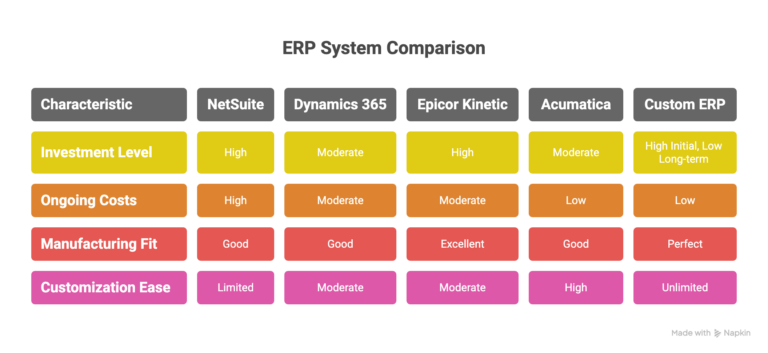
NetSuite
NetSuite ERP is a leading cloud-based solution for managing back-office operations and financial processes. It serves over 24,000 global customers and offers robust financial management, inventory, supply chain, and real-time analytics.
What Works: NetSuite excels at providing comprehensive financial management and real-time visibility across operations. Its cloud-based architecture means automatic updates and accessibility from anywhere, crucial for Texas manufacturers with multiple locations.
What Doesn’t: The system’s complexity can overwhelm smaller manufacturers, and customization often requires expensive add-ons. Many Texas companies find themselves paying for features they’ll never use.
Best For: Mid-sized manufacturers with $10-50 million in revenue who need robust financial reporting and can afford the higher price point.
Microsoft Dynamics 365
Microsoft Dynamics 365 Business Central is an ERP for small to mid-sized businesses, offering integrated solutions for finance, manufacturing, and sales. It seamlessly integrates with Microsoft tools, offers real-time cloud access, and scales with business growth.
What Works: If your team already uses Microsoft Office, the integration feels natural. The AI capabilities through Copilot can genuinely improve decision-making for manufacturing operations.
What Doesn’t: The manufacturing modules often feel like afterthoughts added to a financial system. Complex production scheduling requires workarounds that custom solutions handle natively.
Best For: Manufacturers heavily invested in the Microsoft ecosystem who prioritize familiar interfaces over manufacturing-specific functionality.
Epicor Kinetic
Epicor Kinetic, formerly Epicor ERP, is tailored for various manufacturing needs. It offers both cloud and on-premises options and excels in real-time monitoring, quality management, and global financial integration.
What Works: Built specifically for manufacturing, Epicor understands production workflows better than general-purpose ERPs. The shop floor integration is genuinely useful.
What Doesn’t: The user interface feels dated compared to modern custom solutions. Reporting capabilities often require additional modules.
Best For: Traditional manufacturers who prioritize manufacturing-specific features over modern user experience.
Acumatica
Acumatica Cloud ERP is a versatile system tailored for growing businesses. It integrates accounting, sales, and customer management with industry-specific add-ons and advanced technologies like AI and IoT.
What Works: The unlimited user licensing model appeals to growing manufacturers. Modern cloud architecture provides flexibility that older systems lack.
What Doesn’t: Manufacturing modules are newer and less mature than financial modules. Integration with specialized manufacturing equipment often requires custom development anyway.
Best For: Growing manufacturers who want to avoid per-user licensing costs and don’t mind working with a less established manufacturing platform.
Custom ERP: Built for Your Texas Manufacturing
What Works: Custom ERP solutions adapt to your exact manufacturing processes instead of forcing you to change how you work. They integrate with your existing equipment, handle your specific compliance requirements, and scale as your business grows. No paying for features you’ll never use, no workarounds for critical processes, and no vendor lock-in that limits your future choices.
What Doesn’t: Custom development requires more upfront planning and a longer initial timeline than installing off-the-shelf software. You need to work with experienced developers who understand manufacturing and provide clear requirements from the start. It’s not the right choice if you need a system running next month or if your processes are completely standard.
Best For: Texas manufacturers with unique processes, specific compliance requirements, or growth plans that will quickly outgrow generic systems. Perfect for companies tired of expensive workarounds, those planning significant expansion, or manufacturers who see their ERP as a competitive advantage rather than just back-office software.
Stop settling for software that almost fits your needs.
Why Manufacturing Companies Need Both ERP and CRM Systems
In manufacturing, the real challenge isn’t choosing between systems, it’s connecting them. Sales lives in the CRM. Inventory, production, and fulfillment live in the ERP. When those systems don’t talk, teams are forced to fill in the gaps manually, with emails, spreadsheets, and guesswork.
Here’s what happens when your ERP and CRM don’t integrate properly:
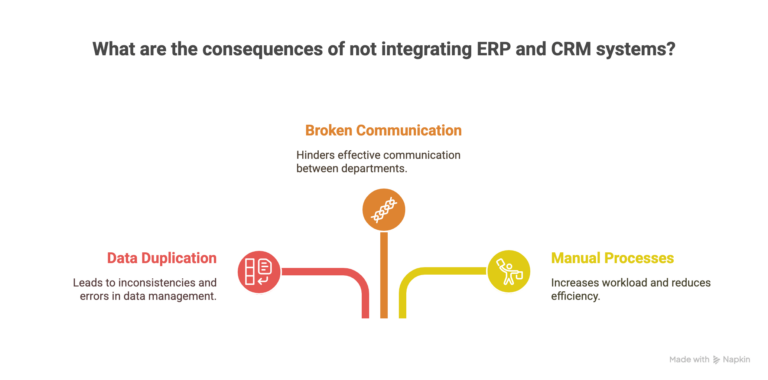
Data Duplication Nightmares: Sales enters customer information into the CRM. Production re-enters the same data in the ERP. When details don’t match, orders get delayed, inventory gets miscounted, and customers get frustrated.
Broken Communication Chains: A customer calls asking about their order status. Your sales rep checks the CRM and sees “Order Confirmed.” Meanwhile, production is waiting for materials that won’t arrive for two weeks. Guess who gets the angry callback?
Manual Process Multiplication: Without integration, simple processes become complex workflows. Updating a delivery date requires changes in multiple systems, notifications to multiple teams, and hope that nothing falls through the cracks.
Benefits of ERP CRM Integration:
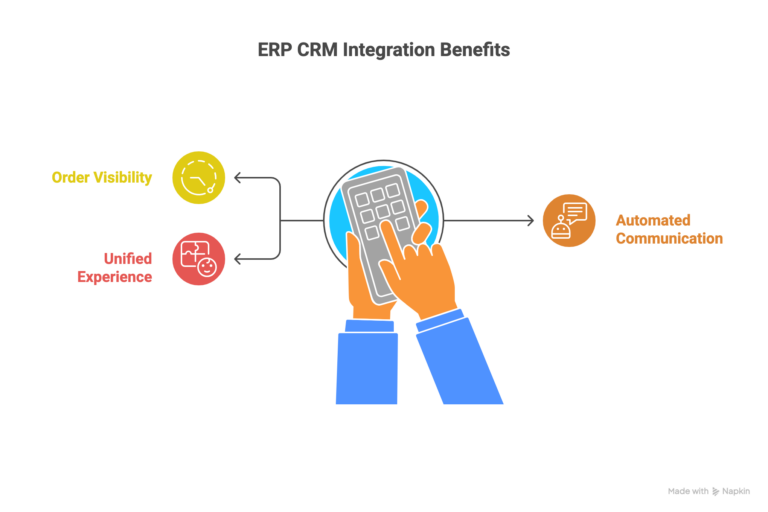
Real-Time Order Visibility: When a customer places an order through your e-commerce platform, it automatically flows to both CRM (for sales tracking) and ERP (for production scheduling). Everyone sees the same information in real-time.
Automated Communication: Production delays trigger automatic notifications to sales teams, who can proactively contact customers before they call asking about their orders.
Unified Customer Experience: Whether a customer talks to sales, production, or customer service, everyone has access to the complete order history, production status, and delivery timeline.
A well-integrated CRM and ERP setup gives your team a single source of truth, where every quote, order, update, and delivery status is visible across departments. That’s when things start to flow—from sales to ops to service.
Tip: When evaluating ERP systems, ask for a live demo of the CRM integration. Don’t accept promises of “easy integration,” see it working with real data.
Custom ERP Solutions vs Off-the-Shelf: Which ERP for Manufacturing?
Here’s the truth, most ERP vendors won’t tell you, sometimes building custom beats buying pre-built.
Every ERP vendor will tell you their system is “configurable” and “flexible.” But here’s what they mean: you can change the colors, rearrange some fields, and maybe add a few custom reports. When you need real changes, like adapting to your unique production process or integrating with specialized equipment, you’re looking at expensive customizations that often break with updates.
Flexibility
Off-the-Shelf Reality: While there are many off-the-shelf CRM systems available, these solutions are not always the best fit for every organization. Building a custom CRM system can offer a range of benefits, including increased flexibility, greater control over features and functionality, and the ability to tailor the system to the specific needs of your business. The same principle applies to ERP systems.
Custom Solution Advantage: Your business processes drive the system design, not the other way around. If you need to track serial numbers through 15 assembly stages while managing supplier certifications and customer-specific requirements, a custom ERP handles this natively.
Ready to discuss your specific requirements?
Texas-Specific Manufacturing Requirements
Texas manufacturers face unique geographic, regulatory, and supply chain challenges daily. Custom ERP solutions address these specific complexities from the ground up.
Hidden Costs of Off-the-Shelf ERPs:
- User license increases as you grow
- Expensive integrations with specialized equipment
- Lost productivity from workarounds
- Consultant fees for ongoing customizations
Implementation Timeline
Off-the-Shelf Timeline:
- 3-6 months: System configuration and customization
- 2-4 months: Data migration and testing
- 1-3 months: Training and go-live
- Total: 6-13 months
Custom ERP Timeline:
- 2-4 months: Requirements gathering and design
- 4-8 months: Development and testing
- 1-2 months: Deployment and training
- Total: 7-14 months
The timelines are surprisingly similar, but custom solutions deliver exactly what you need rather than forcing compromises.
Tip: Calculate total cost of ownership over 5-7 years, not just initial implementation costs. Custom solutions often cost less long term while delivering better functionality.
Best ERP for Manufacturers by Texas Industry Type
Oil & gas manufacturers have different needs than electronics companies; your ERP system should reflect that reality.
Texas manufacturing spans diverse industries, each with unique requirements that generic ERP systems struggle to address. Let’s examine what works for each major sector.
Oil & Gas Manufacturing ERP Requirements
Unique Challenges:
- Hazardous material tracking and compliance
- Equipment certification and maintenance schedules
- Environmental reporting (EPA, TCEQ)
- Multi-site project coordination
What Works: Custom solutions excel here because they can integrate directly with safety monitoring systems, automatically generate compliance reports, and handle the complex approval workflows that oil and gas operations require.
What Doesn’t: Off-the-shelf ERPs treat safety compliance as an add-on module rather than core functionality, leading to expensive customizations and potential compliance gaps.
Aerospace Manufacturing Systems
Unique Challenges:
- FAA certification requirements
- Material traceability to source
- Quality documentation for every component
- Export control compliance (ITAR)
What Works: Custom ERP solutions can build traceability into every transaction automatically, generate FAA-compliant documentation, and integrate with specialized quality control equipment.
What Doesn’t: Generic manufacturing modules in off-the-shelf ERPs require extensive customization to handle aerospace documentation requirements, often doubling implementation costs.
Automotive ERP for Manufacturing
Unique Challenges:
- Just-in-time inventory coordination
- Supplier certification management
- Recall tracking capabilities
- Quality standards compliance (ISO/TS 16949)
What Works: Custom solutions can optimize for specific automotive supply chain patterns and integrate directly with supplier systems for real-time coordination.
Electronics Manufacturing Software
Unique Challenges:
- Component lifecycle management
- Rapid design changes
- Supply chain volatility
- Regulatory compliance (RoHS, REACH)
What Works: Custom ERPs can adapt quickly to changing component specifications and integrate with design tools for engineering change management.
Food Processing ERP Solutions
Unique Challenges:
- FDA compliance and traceability
- Shelf life and expiration tracking
- Batch genealogy requirements
- HACCP documentation
What Works: Custom solutions can automate FDA reporting, track ingredients from farm to finished product, and ensure compliance with food safety regulations.
ERP Implementation Services: How to Get It Right in Texas
Even the best ERP for manufacturing fails without proper implementation. Here’s how Texas companies succeed where others stumble.
By taking a structured approach to ERP selection, you can invest in a solution that drives efficiency, improves decision-making, and supports the future growth of your business.
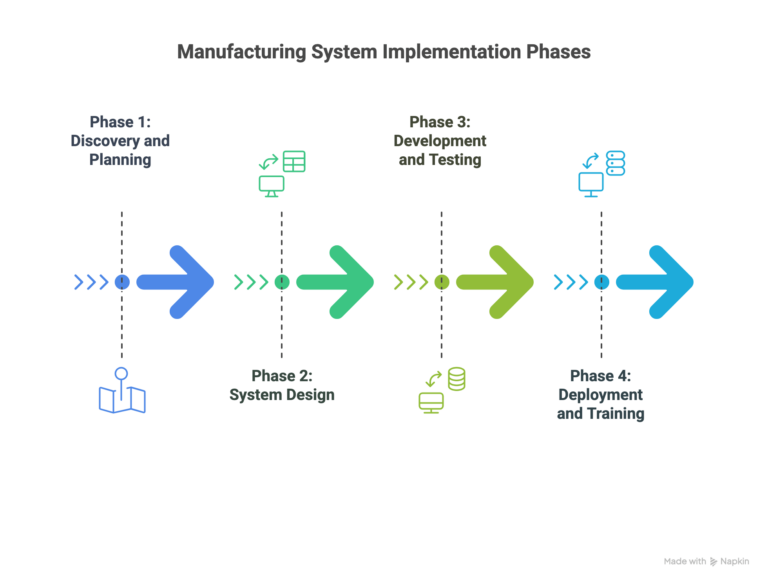
Phase 1: Discovery and Planning
- Manufacturing process mapping
- Integration requirements analysis
- Compliance needs assessment
- Team training requirements
Phase 2: System Design
- Custom workflow development
- Integration architecture design
- User interface optimization
- Testing protocol creation
Phase 3: Development and Testing
- System build and configuration
- Integration development
- User acceptance testing
- Performance optimization
Phase 4: Deployment and Training
- Phased rollout strategy
- Team training programs
- Go-live support
- Performance monitoring
Success Factors for Texas Manufacturers:
Industry Experience: Work with teams that understand your specific manufacturing sector. Generic implementation approaches often miss critical industry requirements.
Change Management: Manufacturing teams are often skeptical of new systems. Successful implementations include comprehensive change management strategies.
Tip: Plan for 20% longer implementation times than vendors estimate. It’s better to under-promise and over-deliver than face production disruptions from rushed deployments.
Why 2HatsLogic’s Custom ERP Solutions Work Better for Texas Manufacturers
We’ve helped dozens of Texas manufacturers move beyond generic ERP limitations. Here’s how our approach differs.
At 2HatsLogic, we’ve spent years perfecting headless commerce solutions and custom platform development. This experience taught us something crucial: businesses succeed when technology adapts to their processes, not when they’re forced to adapt to generic software limitations.
Our Texas Manufacturing Expertise:
Headless Commerce Integration: Many Texas manufacturers sell both B2B and direct-to-consumer. Our custom ERP solutions integrate with modern e-commerce platforms, providing real-time inventory updates and automated order processing.
API-First Architecture: Our custom ERPs connect easily with existing systems, from legacy accounting software to modern IoT sensors on production equipment. No forced replacements, no data silos.
Scalable Cloud Infrastructure: Built on modern cloud platforms, our solutions scale automatically as your business grows. No expensive hardware upgrades or capacity planning nightmares.
Local Development Team: Our developers understand Texas business culture and manufacturing requirements. We’re not adapting offshore templates, we’re building solutions specifically for Texas manufacturers.
Why Custom Solutions Win:
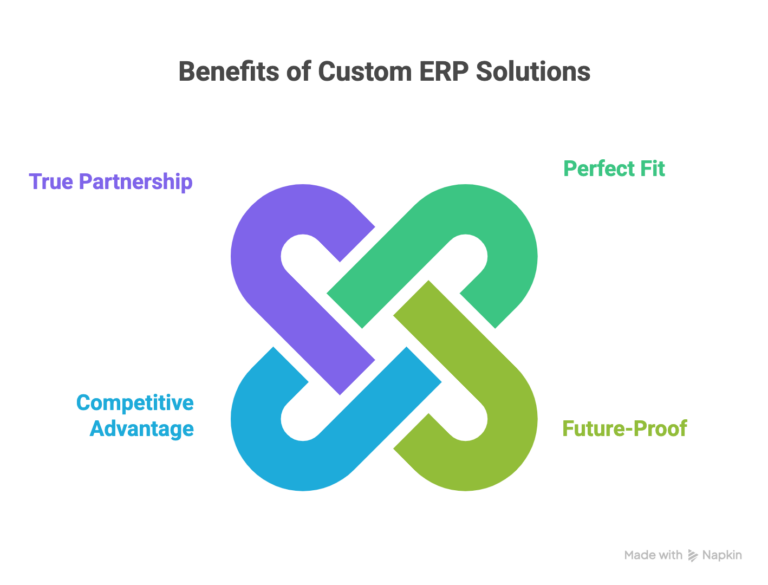
Perfect Fit: Your ERP works exactly how your business works, not how generic software thinks manufacturing should work.
Future-Proof: As your business evolves, your ERP evolves with it. No expensive migrations or system replacements.
Competitive Advantage: While competitors struggle with generic software limitations, you have tools built specifically for your success.
True Partnership: We don’t disappear after implementation. We’re your long-term technology partners, helping you adapt and grow.
ERP System for Manufacturing: Your Decision Framework
Ready to choose? Use this framework to determine whether custom ERP solutions or off-the-shelf systems fit your Texas manufacturing business.
| Factor | Off-the-Shelf | Custom |
| Best if you have: | Standard processes, limited budget, simple needs | Unique processes, growth plans, complex integration |
| Timeline: | Faster initial deployment | Longer development, faster long-term changes |
| Cost: | Lower upfront, higher long-term | Higher upfront, lower long-term |
| Flexibility: | Limited to vendor roadmap | Complete control |
| Risk: | Vendor dependency | Technology partner dependency |
Tip: The best ERP system for manufacturing is the one that solves your specific problems, not the one with the most features or lowest price.
Conclusion
The manufacturing industries in Texas continue to evolve rapidly. Companies are integrating their business applications with other new technologies to improve core processes and operational efficiency. For example, integration with IoT capabilities is becoming increasingly sophisticated.
Smart manufacturers are realizing that generic software creates generic results. While off-the-shelf ERP systems serve a purpose, they often force compromises that limit growth and competitive advantage.
If you’re still using spreadsheets and manual processes, any modern ERP will improve your operations. But if you’re ready to gain a real competitive advantage, consider custom solutions that work exactly how your business works.
FAQ
How long does ERP implementation typically take for Texas manufacturers?
Implementation timelines vary significantly. Off-the-shelf ERPs typically take 6-13 months, while custom ERP solutions take 7-14 months. The timeline depends on your company size, complexity of processes, data migration needs, and level of customization required.
Why do Texas manufacturers need specialized ERP systems?
Texas has unique manufacturing challenges including multi-timezone operations, diverse regulatory requirements (EPA, FAA, FDA), complex supply chains, and rapid growth dynamics. Generic ERP systems treat these as edge cases, while specialized systems handle them as core functionality.
Is custom ERP more expensive than off-the-shelf systems?
Custom ERP often has higher upfront costs but lower long-term expenses. You avoid ongoing license fees, expensive customizations, and productivity losses from workarounds. Over 5-7 years, custom solutions often cost less while providing better functionality.
Table of contents
- Why Manufacturing Companies in Texas Need Specialized ERP Systems
- Top Off-the-Shelf Solutions in 2025
- Why Manufacturing Companies Need Both ERP and CRM Systems
- Custom ERP Solutions vs Off-the-Shelf: Which ERP for Manufacturing?
- Best ERP for Manufacturers by Texas Industry Type
- ERP Implementation Services: How to Get It Right in Texas
- Why 2HatsLogic's Custom ERP Solutions Work Better for Texas Manufacturers
- ERP System for Manufacturing: Your Decision Framework
- Conclusion

Related Articles




